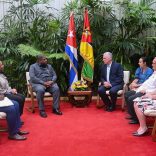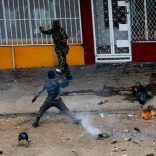Mozambique, Botswana and Zambia Presidents to attend Peter Mutharika inauguration – Malawi ...
Situation in Mozambique is “stable”, says PM – AIM report

Photo: A Verdade
Despite the continuing drive against terrorist groups in the northern province of Cabo Delgado, Mozambican Prime Minister Carlos Agostinho do Rosario on Wednesday described the overall situation in the country as one of “stability, characterized by the normal functioning of democratic institutions and by respect for the fundamental rights and freedoms of citizens, enshrined in the Constitution”.
He was speaking in the country’s parliament, the Assembly of the Republic, answering requests for information on the situation in Cabo Delgado from all three parliamentary groups (of the ruling Frelimo Party, the former rebel movement Renamo, and the second opposition party, the Mozambique Democratic Movement, MDM).
The entry of military contingents from Rwanda and from member countries of the Southern African Development Community (SADC) has transformed the situation, notably with the recapture from the ISIS terrorists, by a joint Mozambican-Rwandan force, of the port town of Mocimboa da Praia on 7 August.
“In Cabo Delgado, the situation is characterized by the dismantling of enemy bases and the pursuit of the terrorists, actions carried out by our defence and security forces in coordination with the forces of SADC and of Rwanda”, said Rosario. “The action and bravery of the joint forces has allowed us to drive the terrorists back from the places they had occupied”.
The allied forces, the Prime Minister added, are “cleaning up and consolidating” the areas they have retaken. Some roads, previously impassable because of terrorist activities, have now been reopened, he said, mentioning in particular the Litamunda-Miengalewa, Xitaxi-Chitunda and Chinda-Awasse stretches.
Some of the hundreds of thousands of people displaced by terrorist raids are beginning to return to their homes in Quissanga, Mocimboa da Praia, Nangade and Muidumbe districts, said Rosario. Their return “is being monitored and coordinated by the defence and security forces”.
A Cabo Delgado reconstruction plan is now under way and “it seeks fundamentally to guarantee the essential conditions for bringing life back to normal in the areas affected by terrorism”.
The top priority, Rosario said, “is to guarantee emergency food aid to the people living in the affected areas and to those who have just returned to their zones of origin”.
The government had also set about restoring basic services. Thus the districts of Macomia, Mocimboa da Praia, Mueda, Nangade, Quissanga and Palma have all been reconnected to the national electricity grid, and damaged low and medium voltage transmission lines in the district capitals have been repaired.
The water supply system in Mocimboa da Praia town has been put back into working order, said Rosario, and mobile phone coverage has been restored in Mocimboa da Praia and Palma.
The total cost of the recovery plan is put at 300 million US dollars, of which 200 million are for actions that will have an immediate impact on people’s living standards.
Rosario argued that the barbaric acts practiced by the terrorists in Cabo Delgado “are different from a normal war. What is happening in the districts in the north of Cabo Delgado are acts of terror, where innocent and defenceless people are beheaded, and kidnapped, and even young children are abducted and are not spared from these heinous acts”.
“The terrorists act in this way to spread fear and terror among the population, and to create instability and insecurity”, he continued. “They take advantage of the situation to promote the interests of specific individuals and/or groups, opening the path for trafficking in guns, drugs or people, and for other types of crime that involve organised criminal networks”.
Rosario pointed out that the international community is taking a clear stand against terrorism which has become “a global phenomenon”. Mozambique had been active diplomatically to mobilise support from across the globe for its fight against terrorism in Cabo Delgado.
“No government can be indifferent to situations of extreme terror and violence”, he stressed. “Aware of its responsibilities, the Mozambican government has not abdicated from its mission to protect the population, and to guarantee tranquility, security and territorial integrity against any type of threat”.
Hence the presence of SADC and Rwandan contingents on Mozambican soil, fighting side by side with the Mozambican defence forces against the terrorists. Rosario believed this was fully in line with Mozambican law and with the various international treaties Mozambique has signed.
In the ensuing debate most of the contributions from Renamo deputies consisted of complaints that the government had violated the Constitution by bringing foreign troops into the country without seeking authorisation from the Assembly. Ironically, it was Renamo, many months ago, which was the first Mozambican political party to call for foreign intervention, long before any Rwandan or SADC troops had entered the country.












Leave a Reply
Be the First to Comment!
You must be logged in to post a comment.
You must be logged in to post a comment.